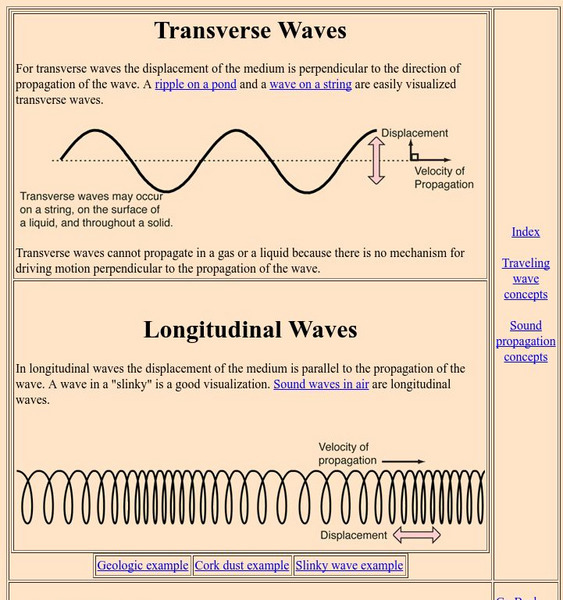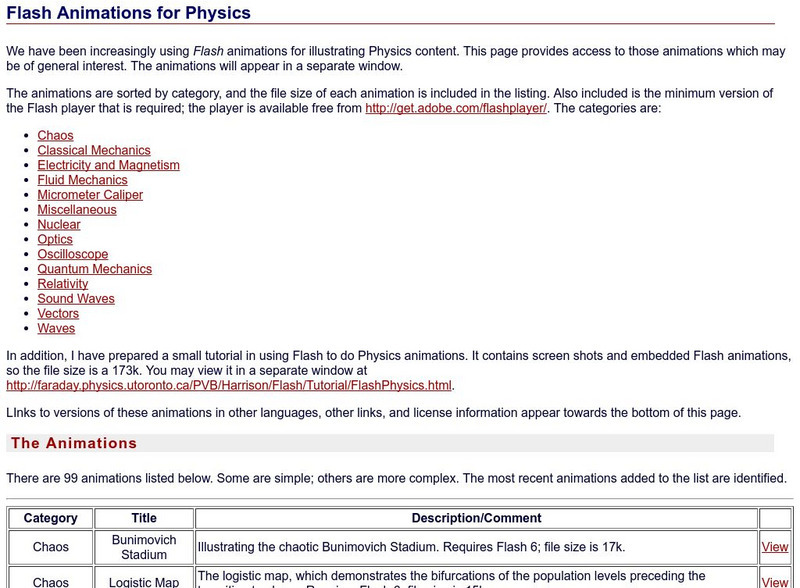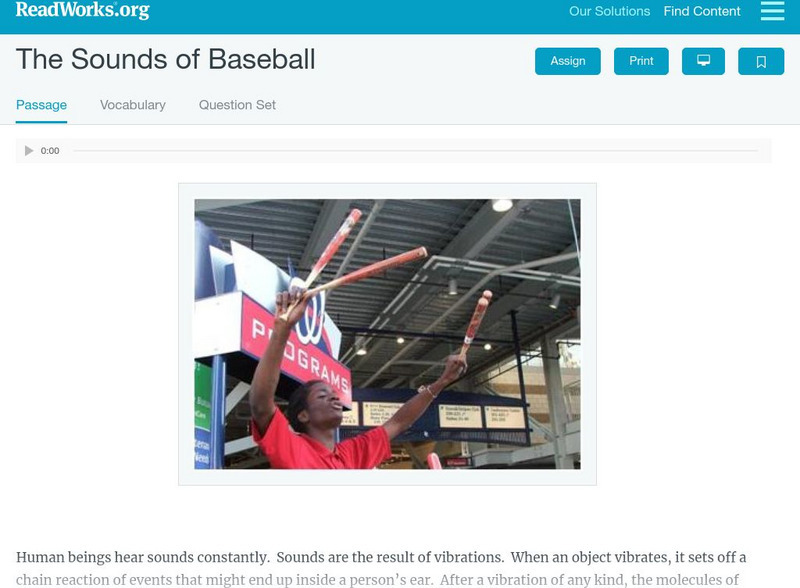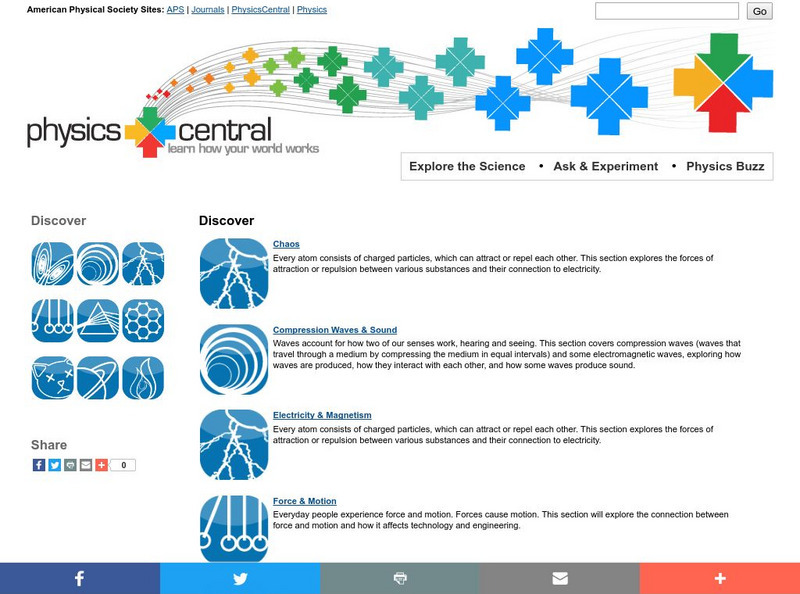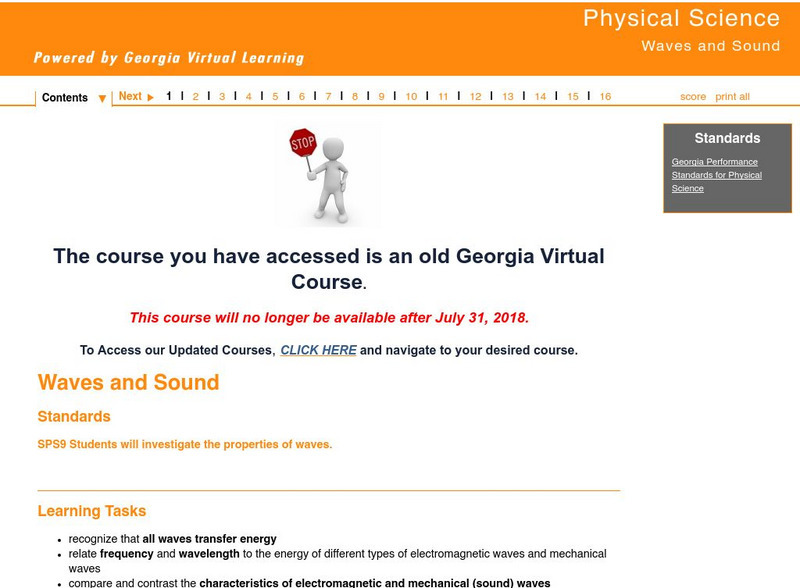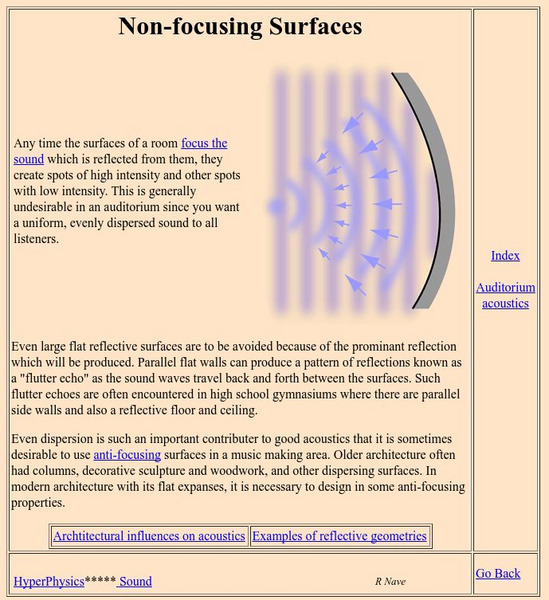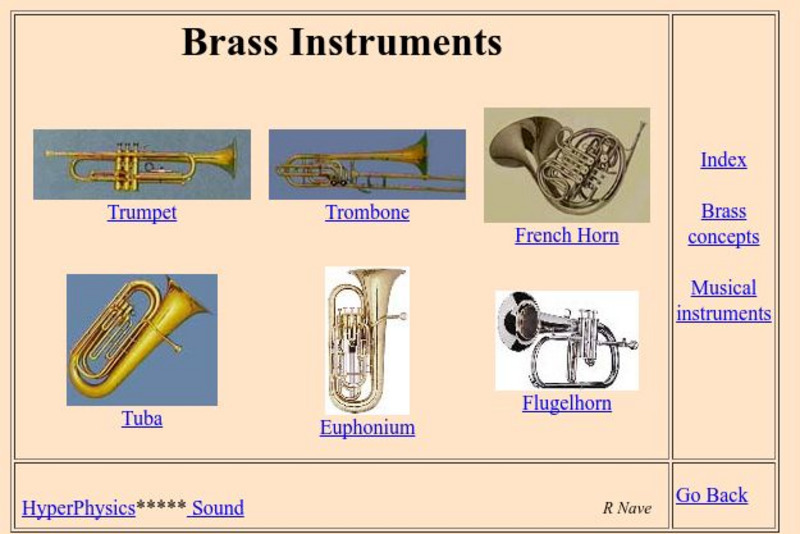Physics Classroom
The Physics Classroom: Boundary Behavior
Educational tutorial features a physics tutorial on the behavior of sound waves specifically focusing upon boundary behavior. Be sure to view the attached animations for further understanding.
Physics Classroom
The Physics Classroom: Waves and Sound: Standing Wave Patterns Interactive
Students investigate the formation of standing waves, the vibrational patterns associated with the various harmonics, and the difference between transverse and longitudinal standing waves.
Georgia State University
Georgia State University: Hyper Physics: Transverse and Longitudinal Waves
The physics tutorial illustrates and explains the distinction between transverse and longitudinal waves. Related links provided.
Georgia State University
Georgia State University: Hyper Physics: Water Tube Resonance Experiment
Online physics lab experiment in which students use resonating waves inside of a closed-end air column to determine the speed of sound. The form allows students to check their answers and receive immediate feedback.
CK-12 Foundation
Ck 12: Physics: Waves Study Guide
[Free Registration/Login may be required to access all resource tools.] This guide gives a detailed overview of mechanical waves and the characteristics of waves. Covers wave behavior, including types of interference, resonance, and the...
Georgia State University
Georgia State University: Hyper Physics: Wave Motion
Two wave graphs depicting a sine wave and relating the various characteristics (wavelength, amplitude, frequency, and period) of a wave to each other. The site includes an interactive JavaScript form in which the visitor enters one...
Khan Academy
Khan Academy: Transverse and Longitudinal Waves Review
Overview of key terms and skills for waves, including how to identify longitudinal and transverse waves.
Georgia State University
Georgia State University: Hyper Physics: The Place Theory
An indexing page for an elaborate and in-depth hyper-textbook on various physics topics. This page indexes several others which pertain to human ability to perceive sound and recognize pitch. Introduces and explains Place Theory.
CK-12 Foundation
Ck 12: Physical Science: Intensity and Loudness of Sound
[Free Registration/Login may be required to access all resource tools.] Discusses the intensity of sound and how it relates to loudness, the decibel levels of different sounds, and factors that affect sound intensity.
CK-12 Foundation
Ck 12: Physical Science: Wavelength
[Free Registration/Login may be required to access all resource tools.] What wavelength is and how it relates to the energy of a wave.
Georgia State University
Georgia State University: Hyper Physics: Interference of Sound
Information about the interference of sound and its causes. Well-illustrated and good explanations of the concepts; part of a large hyper-textbook on various physics concepts.
University of Toronto (Canada)
University of Toronto: Flash Animations for Physics
This site boasts an extensive list of physics animations that cover topics such as electricity, magnetism, quantum mechanics, and relativity. Variables can be manipulated for each demonstration.
OpenStax
Open Stax: Catherine Schmidt Jones: Sound and Music
Introduce some activities that introduce students to the physics of sound. They will also learn how various instruments produce sound. Included are downloadable pdf worksheets and answer sheets to use.
Read Works
Read Works: The Sounds of Baseball
[Free Registration/Login Required] An descriptive text about the sounds a person would hear at a baseball game. A question sheet is available to help students build skills in reading comprehension.
Physics Classroom
The Physics Classroom: Sound Waves and Music: Guitar Strings
A guitar string has a number of frequencies at which it will naturally vibrate. These natural frequencies are known as the harmonics of the guitar string. Students work through several example problems.
Physics Classroom
The Physics Classroom: Sound Waves and Music:fundamental Frequency and Harmonics
For musical instruments and other objects that vibrate in regular and periodic fashion, the harmonic frequencies are related to each other by simple whole number ratios. Students learn why these whole number ratios exist for a musical...
Physics Classroom
The Physics Classroom: Echo vs. Reverberation
Learn the difference between an echo and a reverberation on this reference page. Page includes an animation to show the difference.
Physics Central
American Physical Society: Physics Central: Discover Homepage
Link to nine major physics topics and dig deeper into the content. Find out about the work of scientists in each field and see example physical science experiments.
Georgia Department of Education
Ga Virtual Learning: Physical Science: Waves and Sound
In this module, students investigate the properties and behavior of different types of waves.
Georgia State University
Georgia State University: Hyper Physics: Non Focusing Surfaces
This hypertext physics course tutorial on nonfocusing surfaces relates various design principles to good auditorium design. Illustrated.
University of Kentucky
The Physics and Math of Music
Read about a math research project done by three college students which helps us see physics and math in music. Here's a great approach for integrating curriculum!
Georgia State University
Georgia State University: Hyper Physics: Brass Instruments
Understand the science of sound when performing with a brass instrument such as a trumpet or a trombone.
Other
Physics of Sound/image Analysis of Sound Pressure
A discussion on how to locate the sound image based upon the incident and reflected pulse of sound heard at a given location. For those looking for a challenge, follow the links to view derivations of wave equations for sound (uses...



